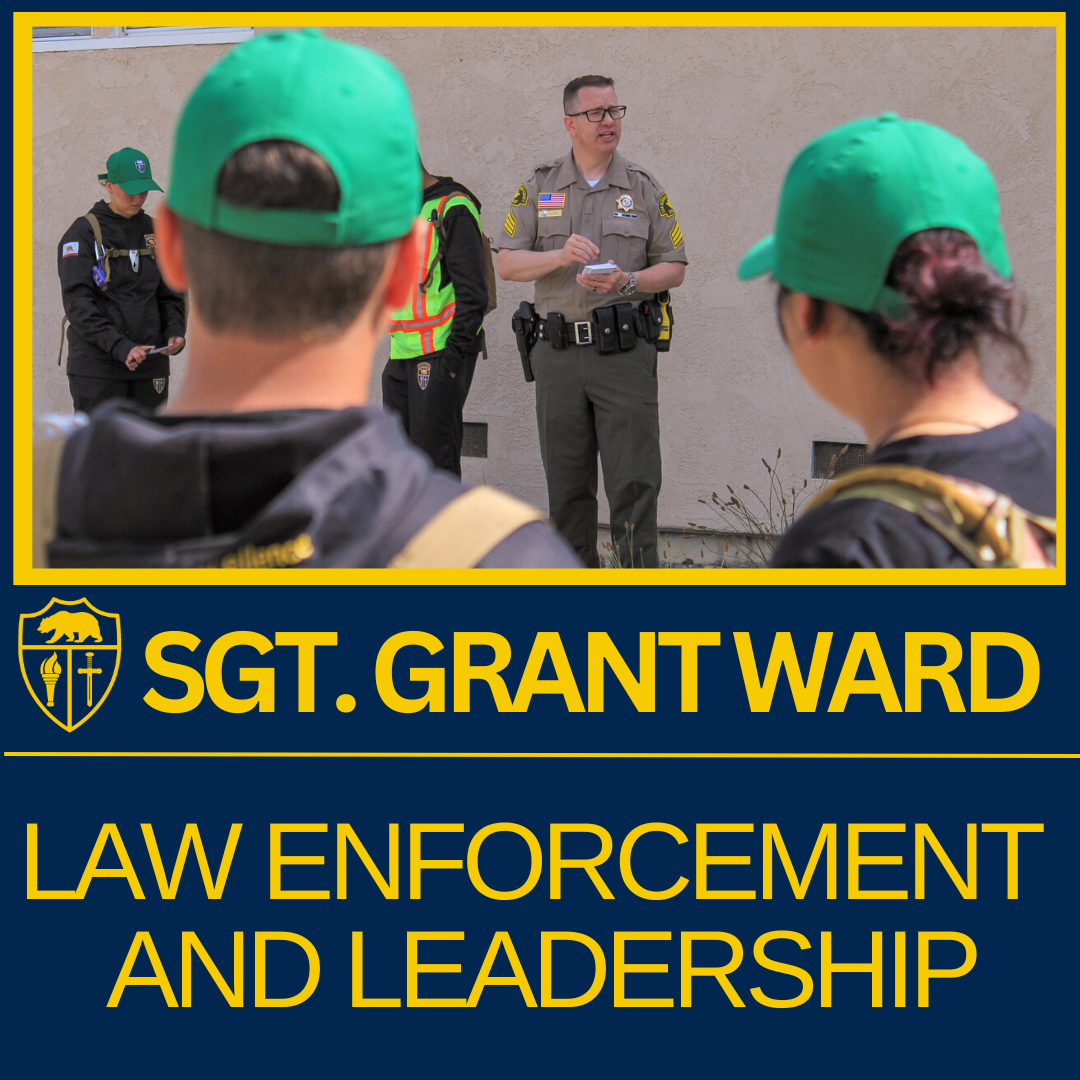
CAMP SAN LUIS OBISPO, Calif. — Five years ago, when Grant Ward, a sergeant with the San Bernardino County Sheriff's Department, first participated in the California Cadet Corps Summer Encampment as the Law Enforcement Unit instructor, he could not have imagined that he would become so passionate about the work: “It's really cool to see the cadets learn and grow from day one to the end of the program.”
Ward, 44, has served with the San Bernardino County Sheriff’s Department since 2004. Prior to that, he served as a deputy with the Los Angeles County Sheriff’s Department for 7 years. For the past 6 years, he has served as the full-time elected union president of the Sheriff's Employee’s Benefit Association (SEBA), representing the 4,000 active and retired law enforcement professionals in San Bernardino County. He also serves as the elected representative of Southern California’s law enforcement officers as an Executive Board member of the Peace Officers Research Association of California (PORAC), representing its 80,000 law enforcement members.
Cadets finish the course not just having grown in their understanding of law enforcement, but also having grown in their lives because of the education, Ward has observed. “Every class that's put on by the California Cadet Corps imparts some type of wisdom about living a better life and seeking ways to better our communities.”
One such cadet is Staff Sergeant Layla Fleury, a rising sophomore at Serrano High School in Phelan, and a member of the 279th Battalion. “Being a part of law enforcement unit helps prepare me for my future because I'm very interested in becoming a police officer and I definitely want to try and make a difference in people's lives.”
Having a serving law enforcement officer like Sgt. Ward as an instructor, cadets gain a deeper understanding of the demands of the job. “We try to instill in the cadets how law enforcement came about, what our role is, how we're dealing with trends and issues within the communities we serve, and what we expect and are planning to do in the future.” The unit also includes sections on statutory laws, case law, drug recognition, field interviews, as well as dynamic situations including foot pursuits and building searches. “I’m passionate about helping these young men and women better understand our law enforcement professionals were born and raised in the communities they serve.”
It’s important our communities know what our law enforcement officers are trained to do and why they do it that way. It is important our communities know our officers are people too. We make decisions based on training and experience. These decisions are made while reacting to very dynamic situations and the unpredictable actions of those we interact with. The
California Cadet Corps provides a window into law enforcement training and decision making in hopes to better prepare these cadets for very real circumstances they may encounter in their lives. They then take these lessons back to their homes across the state. The experience can then assist innumerable families and community members,” Ward said.
“It is an honor to stand in front of these cadets and shed some light about what I've learned dealing with very bad situations as well as very good situations. I’m proud to help the cadets navigate those life experiences,” Ward said. “I hope they can take a portion of what we teach here home with them. Lessons like controlling what can be controlled and not to stress about things out of your control.” Ward noted, “A lesson which is relevant to every profession and career.”
The Law Enforcement Unit also educates on individual rights under the law. “First-hand things like understanding people's Constitutional rights. Answering the question, what does it mean to have a constitutional right?”, Ward explained. “We go into depth with the cadets to help explain, for example, the right to assembly and the right to protest.” Ward said that he hopes when the cadets return to their community, no matter what career they ultimately choose to pursue, “they will be that much more effective and helpful, not just for themselves but also their families, their friends, and anybody who associates with them. We all benefit from having a better understanding of these important issues.”
“The Law Enforcement Unit has been a lot of fun and I’ve learned so much,” said Cadet Sergeant Beau Everest Fisher, a recent graduate of Union Mine High School in El Dorado. “At the Summer Encampment, we can’t use our phones and I realized how much more I talk with people and enjoy doing so because we’re not just on Instagram or Tick Tock all day.”